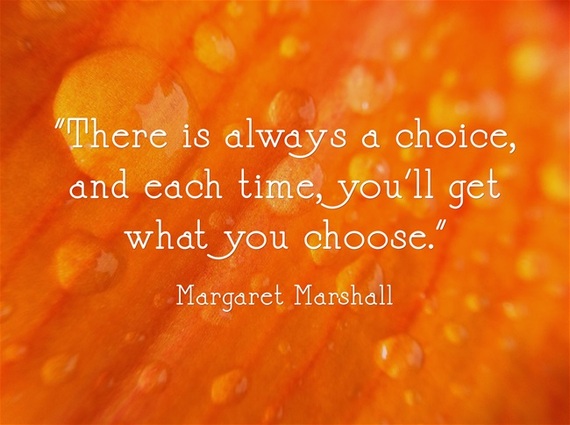Salespeople will say that when the answer they receive to their sales pitch is, no, in their mind, no means, not now. The consumer is just not ready to purchase what they have to offer.
This is true in our lives as well. Often I've heard women say that the first time their husband asked for a date, her answer was no. Obviously in time, no was changed to a yes and her no meant not now.
Often others ask us to eat with them, but eating is not what we planned at that time. Yet we are tempted to eat the items that are offered because we want to be included, we don't want to hurt someone's feelings, or we just don't know how to speak up for ourselves.
At times, no means not now, but it can also mean a solid no! I think we must understand how and when our no response should be taken seriously. I advise my clients that no is a complete sentence. No, thank you, is a polite complete sentence. We also must recognize when our no is our final answer, or when we are communicating, not now, with our words, tone, or body language.
No food is off-limits, but there should be limits on food. There is a difference between no, and not now. Understanding this concept gives you the power to eat food when you choose to eat it and not when others choose it for you.
Have you given in easily in the past?
In past food situations, have you given in easily? If so, this is how others know you. They know that it doesn't take much encouragement from them to get you to say yes and eat something you never wanted. It's time to show them differently. Actions speak louder than words. Your tone and body language should shield you from their words. The person with the strongest conviction always wins.
Do you offer too many excuses?
Do you say shouldn't, can't, or won't in your response? "I really shouldn't, I'm trying to lose weight." "I've been so good lately, I can't blow it." "I won't eat that, I'm weighing in tomorrow." Do these responses sound familiar? These are statements of weakness and the other person hears, "Keep pushing me and I'll eat with you." Use as few words as possible in your answer. Using too many words shows your weakness and gives the other person an opening to convince you otherwise. Here is where a solid no is useful, and if you feel polite, use a strong no thank you.
Were you previously their eating buddy?
Does eating together define your relationship? If so, you are the one that changed, not them. You cannot expect someone to change because you choose a different set of habits. Be patient with them. Explain as clearly as you can, without deep details, the expectations you have for yourself. Your goals and new patterns should be left unsaid. They will see the changes in your actions, and that is more powerful than your words. Realize that you can still eat together, but it needs to be a good fit with your goals.
Do you listen to the intent behind the words of others?
When someone continually offers you food, it could be for many reasons, but their reasons are irrelevant. What is relevant is how you want to treat yourself and care for your health. Listen to the intent in their offering. If it's coming from love, accept their love without the food. You can say, "Thank you. You are so kind, maybe later." You've just said no without using the word. Again, the less you say, the more powerful you are. Often the intent is jealousy. Behind their words are unsaid emotions: "I'm envious of you. You are accomplishing something I cannot." Here a solid no or no thank you, will work. When you can hear the true intent, you can choose your short reply.
Always Remember
If you eat every time you want to eat, and each time someone else wants you to eat, you will gain your weight along with theirs. When someone offers you food, and you say no, it's because you don't want to eat it.
No can mean not now, or it can be a solid no! The choice is yours. Make no a positive response in your life.
Margaret Marshall is The Healthy Living Expert. She is the creator of the "Five-Finger Food Guide", and the author of "Body, Mind, & Mouth" and, "Healthy Living Means Living Healthy".
She is a media personality, and an international speaker presenting wellness programs at corporate functions, higher learning institutions, women's organizations, medical facilities, and cruise ships.
